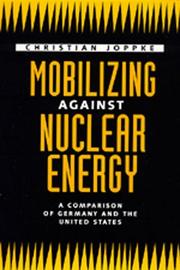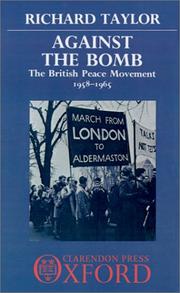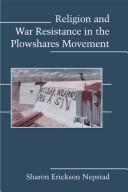| Listing 1 - 10 of 33 | << page >> |
Sort by
|
Book
ISBN: 1108679161 1108627420 1316479749 1107136288 1316501787 Year: 2017 Publisher: New York : Cambridge University Press,
Abstract | Keywords | Export | Availability | Bookmark
 Loading...
Loading...Choose an application
- Reference Manager
- EndNote
- RefWorks (Direct export to RefWorks)
This book brings together cutting-edge scholarship from the United States and Europe to address political as well as cultural responses to both the arms race of the 1980s and the ascent of nuclear energy as a second, controversial dimension of the nuclear age. Diverse in its topics and disciplinary approaches, Nuclear Threats, Nuclear Fear and the Cold War of the 1980s makes a fundamental contribution to the emerging historiography of the 1980s as a whole. As of now, the era's nuclear tensions have been addressed by scholars mostly from the standpoint of security studies, focused on the geo-strategic deliberations of political elites and at the level of state policy. Yet nuclear anxieties, as the essays in this volume document, were so pervasive that they profoundly shaped the era's culture, its habits of mind, and its politics, far beyond the domain of policy.
Antinuclear movement --- World politics --- Cold War --- Anti-nuclear movement --- Antinuclear protest movement --- Nuclear freeze movement --- Protest movement, Antinuclear --- Social movements --- Nuclear disarmament --- Nuclear power plants --- History

ISBN: 0520912527 0585043752 9780520912526 9780585043753 0520078136 Year: 1993 Publisher: Berkeley, California : University of California Press,
Abstract | Keywords | Export | Availability | Bookmark
 Loading...
Loading...Choose an application
- Reference Manager
- EndNote
- RefWorks (Direct export to RefWorks)
In the past two decades young people, environmentalists, church activists, leftists, and others have mobilized against nuclear energy. Anti-nuclear protest has been especially widespread and vocal in Western Europe and the United States. In this lucid, richly documented book, Christian Joppke compares the rise and fall of these protest movements in Germany and the United States, illuminating the relationship between national political structures and collective action. He analyzes existing approaches to the study of social movements and suggests an insightful new paradigm for research in this area. Joppke proposes a political process perspective that focuses on the interrelationship between the state and social movements, a model that takes into account a variety of forces, including differential state structures, political cultures, movement organizations, and temporal and contextual factors. This is an invaluable work for anyone studying the dynamics of social movements around the world.
Antinuclear movement --- Social movements --- Business & Economics --- Industries --- Movements, Social --- Social history --- Social psychology --- Anti-nuclear movement --- Antinuclear protest movement --- Nuclear freeze movement --- Protest movement, Antinuclear --- Nuclear disarmament --- Nuclear power plants --- Political aspects. --- Political aspects
Book
ISBN: 3839470323 3837670325 Year: 2024 Publisher: Bielefeld : transcript Verlag,
Abstract | Keywords | Export | Availability | Bookmark
 Loading...
Loading...Choose an application
- Reference Manager
- EndNote
- RefWorks (Direct export to RefWorks)
In den 1970er Jahren trat die Frauengesundheitsbewegung als kreative feministische Strömung in Erscheinung, die das männlich dominierte Gesundheitssystem radikal infrage stellte. Ausgehend von aktivistischen Selbstzeugnissen und Interviews können Anliegen, Ziele und Aktionsformen des Protestes von einst genauer beleuchtet werden. In den Schilderungen zwischen Aufbegehren und Professionalisierung zeigt sich: Kritik kann als Politikum dieser sozialen Bewegung gelten. Susanne Boehm legt eine erste gebündelte Betrachtung der bundesdeutschen Frauengesundheitsbewegung vor, die exemplarisch an einem Gesundheitszentrum Berlins ansetzt und zugleich den größeren Diskurs erhellt.
HISTORY / Social History. --- Berlin. --- Body. --- Cultural History. --- Feminism. --- Gender History. --- Gender Studies. --- Gender. --- Health Center. --- History of Medicine. --- Protest Movement. --- Self-help. --- Women's Movement. --- Womens Health Movement.

ISBN: 0198275374 9780198275374 Year: 1988 Publisher: Oxford: Clarendon,
Abstract | Keywords | Export | Availability | Bookmark
 Loading...
Loading...Choose an application
- Reference Manager
- EndNote
- RefWorks (Direct export to RefWorks)
Antinuclear movement --- Nuclear disarmament --- History. --- -Atomic bomb and disarmament --- Atomic weapons and disarmament --- Disarmament, Nuclear --- Nuclear weapons disarmament --- Disarmament --- Nuclear weapons --- Anti-nuclear movement --- Antinuclear protest movement --- Nuclear freeze movement --- Protest movement, Antinuclear --- Social movements --- Nuclear power plants --- History --- -History. --- Atomic bomb and disarmament --- Great Britain --- Antinuclear movement - Great Britain - History. --- Nuclear disarmament - Great Britain - History.
Book
ISBN: 0801499380 9781501719998 1501719998 0801426359 9780801426353 9780801499388 1501720007 1501727974 9781501727979 9781501720000 Year: 2018 Publisher: Cornell University Press
Abstract | Keywords | Export | Availability | Bookmark
 Loading...
Loading...Choose an application
- Reference Manager
- EndNote
- RefWorks (Direct export to RefWorks)
When thousands of women gathered in 1983 to protest the stockpiling of nuclear weapons at a rural upstate New York military depot, the area was shaken by their actions. What so disturbed residents that they organized counterdemonstrations, wrote hundreds of letters to local newspapers, verbally and physically harassed the protestors, and nearly rioted to stop one of the protest marches? Louise Krasniewicz reconstructs the drama surrounding the Women's Encampment for a Future of Peace and Justice in Seneca County, New York, analyzing it as a clash both between and within communities. She shows how debates about gender and authority-including questions of morality, patriotism, women's roles, and sexuality-came to overshadow arguments about the risks of living in a nuclear world. Vivid ethnography and vibrant social history, this work will engage readers interested in American culture, women's studies, peace studies, and cultural anthropology.
812 Ideologie --- 848 Demografie --- 858.1 Politiek geweld --- 861 Vredesbeweging --- 863 Pacifisme --- 873 Wapenbeheersing --- 882.4 Noord-Amerika --- Antinuclear movement --- Women and peace --- Social aspects --- Seneca Army Depot. --- Peace and women --- Peace --- Women pacifists --- Anti-nuclear movement --- Antinuclear protest movement --- Nuclear freeze movement --- Protest movement, Antinuclear --- Social movements --- Nuclear disarmament --- Nuclear power plants --- Romulus, N.Y. --- History of the Americas
Book
ISBN: 0674068661 0674065069 9780674065062 9780674052338 0674052331 9780674068667 Year: 2012 Publisher: Cambridge, Mass. : Harvard University Press,
Abstract | Keywords | Export | Availability | Bookmark
 Loading...
Loading...Choose an application
- Reference Manager
- EndNote
- RefWorks (Direct export to RefWorks)
After a tsunami destroyed the cooling system at Japan's Fukushima Nuclear Power Plant, triggering a meltdown, protesters around the world challenged the use of nuclear power. Germany announced it would close its plants by 2022. Although the ills of fossil fuels are better understood than ever, the threat of climate change has never aroused the same visceral dread or swift action. Spencer Weart dissects this paradox, demonstrating that a powerful web of images surrounding nuclear energy holds us captive, allowing fear, rather than facts, to drive our thinking and public policy.Building on his classic, Nuclear Fear, Weart follows nuclear imagery from its origins in the symbolism of medieval alchemy to its appearance in film and fiction. Long before nuclear fission was discovered, fantasies of the destroyed planet, the transforming ray, and the white city of the future took root in the popular imagination. At the turn of the twentieth century when limited facts about radioactivity became known, they produced a blurred picture upon which scientists and the public projected their hopes and fears. These fears were magnified during the Cold War, when mushroom clouds no longer needed to be imagined; they appeared on the evening news. Weart examines nuclear anxiety in sources as diverse as Alain Resnais's film Hiroshima Mon Amour, Cormac McCarthy's novel The Road, and the television show The Simpsons.Recognizing how much we remain in thrall to these setpieces of the imagination, Weart hopes, will help us resist manipulation from both sides of the nuclear debate.
Antinuclear movement --- Nuclear energy --- Radiation --- Physics --- Radiology --- Atomic energy --- Atomic power --- Energy, Atomic --- Energy, Nuclear --- Nuclear power --- Power, Atomic --- Power, Nuclear --- Force and energy --- Nuclear physics --- Power resources --- Nuclear engineering --- Nuclear facilities --- Nuclear power plants --- Anti-nuclear movement --- Antinuclear protest movement --- Nuclear freeze movement --- Protest movement, Antinuclear --- Social movements --- Nuclear disarmament --- History. --- Psychological aspects. --- Public opinion

ISBN: 9780511619854 9780521888929 9780521717670 0511619855 0511397658 9780511397653 9780511396885 0511396880 0521888921 0521717671 1107187478 1281383457 9786611383459 0511399243 0511396155 0511398409 Year: 2008 Publisher: New York : Cambridge University Press,
Abstract | Keywords | Export | Availability | Bookmark
 Loading...
Loading...Choose an application
- Reference Manager
- EndNote
- RefWorks (Direct export to RefWorks)
As the nuclear arms race exploded in the 1980s, a group of U.S. religious pacifists used radical nonviolence to intervene. Armed with hammers, they broke into military facilities to pound on missiles and pour blood on bombers, enacting the prophet Isaiah's vision: 'Nations shall beat their swords into plowshares and their spears into pruning hooks.' Calling themselves the Plowshares movement, these controversial activists received long prison sentences; nonetheless, their movement grew and expanded to Europe and Australia. In this book, Sharon Erickson Nepstad documents the emergence and international diffusion of this unique form of high-risk collective action. Drawing on interviews, original survey research, and archival data, Nepstad explains why some Plowshares groups have persisted over time while others have struggled or collapsed. Comparing the U.S. movement with less successful Plowshares groups overseas, Nepstad reveals how decisions about leadership, organization, retention, and cultural adaptations influence movements' long-term trajectories.
Nonviolence. --- Antinuclear movement. --- Nuclear disarmament. --- Atomic bomb and disarmament --- Atomic weapons and disarmament --- Disarmament, Nuclear --- Nuclear weapons disarmament --- Disarmament --- Antinuclear movement --- Nuclear weapons --- Anti-nuclear movement --- Antinuclear protest movement --- Nuclear freeze movement --- Protest movement, Antinuclear --- Social movements --- Nuclear disarmament --- Nuclear power plants --- Non-violence --- Government, Resistance to --- Pacifism --- Plowshares Eight (Group) --- Plowshares 8 (Group) --- Social Sciences --- Political Science
Book
ISBN: 9027455163 Year: 1984 Volume: vol 744 Publisher: Utrecht Antwerpen Het Spectrum
Abstract | Keywords | Export | Availability | Bookmark
 Loading...
Loading...Choose an application
- Reference Manager
- EndNote
- RefWorks (Direct export to RefWorks)
Bibliotheek François Vercammen
International movements --- Social ethics --- Pacifisme --- vredesbeweging --- Nederland --- Antinuclear movement --- Peace movements --- -#SBIB:324H74 --- #SBIB:327.5H20 --- 815 Geschiedenis --- 861 Vredesbeweging --- 884.4 West-Europa --- Anti-war movements --- Antiwar movements --- Protest movements, War --- War protest movements --- Social movements --- Anti-nuclear movement --- Antinuclear protest movement --- Nuclear freeze movement --- Protest movement, Antinuclear --- Nuclear disarmament --- Nuclear power plants --- 327 --- 492 --- History. --- History --- Politieke verandering: sociale bewegingen --- Vredesonderzoek: algemeen --- Vredesbeweging --- Vrede --- Antimilitarisme --- Sociale bewegingen --- Oorlog --- #SBIB:324H74 --- vredesbewegingen
Book
ISBN: 2221009878 9782221009871 Year: 1982 Publisher: Paris: Laffont,
Abstract | Keywords | Export | Availability | Bookmark
 Loading...
Loading...Choose an application
- Reference Manager
- EndNote
- RefWorks (Direct export to RefWorks)
Peace. --- Antinuclear movement. --- Paix --- Mouvement antinucléaire --- Soviet Union --- URSS --- Foreign relations --- Relations extérieures --- Peace --- 341.67 --- Coexistence, Peaceful --- Peaceful coexistence --- International relations --- Disarmament --- Peace-building --- Security, International --- War --- Anti-nuclear movement --- Antinuclear protest movement --- Nuclear freeze movement --- Protest movement, Antinuclear --- Social movements --- Nuclear disarmament --- Nuclear power plants --- Ontwapening. Beperking ,vermindering van bewapening. Salt akkoorden. ABC akkoorden. Non-proliferatieverdragen. Oorlogspreventie --- -Foreign relations --- -Antinuclear movement. --- Nuclear power plantsOntwapening. Beperking ,vermindering van bewapening. Salt akkoorden. ABC akkoorden. Non-proliferatieverdragen. OorlogspreventieSoviet Union -Foreign relations --- 341.67 Ontwapening. Beperking ,vermindering van bewapening. Salt akkoorden. ABC akkoorden. Non-proliferatieverdragen. Oorlogspreventie --- -Peace. --- Mouvement antinucléaire --- Relations extérieures --- Antinuclear movement --- Soviet Union - Foreign relations - 1975-1985.

ISBN: 091597214X Year: 1988 Publisher: Coos Bay Vision Books
Abstract | Keywords | Export | Availability | Bookmark
 Loading...
Loading...Choose an application
- Reference Manager
- EndNote
- RefWorks (Direct export to RefWorks)
Antinuclear movement. --- International organization --- Nuclear disarmament --- Peace --- #SBIB:327.5H00 --- #SBIB:324H73 --- Coexistence, Peaceful --- Peaceful coexistence --- International relations --- Disarmament --- Peace-building --- Security, International --- War --- Atomic bomb and disarmament --- Atomic weapons and disarmament --- Disarmament, Nuclear --- Nuclear weapons disarmament --- Antinuclear movement --- Nuclear weapons --- Federation, International --- Global governance --- Interdependence of nations --- International administration --- International federation --- Organization, International --- World federation --- World government --- World order --- World organization --- Congresses and conventions --- Political science --- International agencies --- International cooperation --- World politics --- Anti-nuclear movement --- Antinuclear protest movement --- Nuclear freeze movement --- Protest movement, Antinuclear --- Social movements --- Nuclear power plants --- Strategie en vredesonderzoek: algemeen --- Politieke verandering: oppositie en minderheid, protest, politiek geweld
| Listing 1 - 10 of 33 | << page >> |
Sort by
|

 Search
Search Feedback
Feedback About UniCat
About UniCat  Help
Help News
News